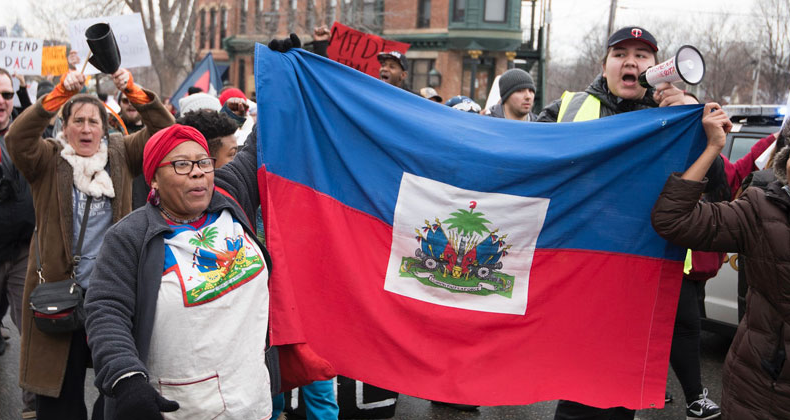
Church Leaders Respond as Travel Ban Hits Largest Diocese – The Living Church
Please email comments to letters@livingchurch.org.
The day after the Trump administration’s travel ban on several countries took effect on June 9, a non-Haitian Episcopal priest who has been leading a fully Haitian congregation on the East Coast for over a decade did not mince words.
“It’s just so arbitrary, mean-spirited, and racist,” he said, highlighting how the Caribbean nation, one of 12 countries on the list, is predominantly Black. He also said that all countries affected by the second iteration of Trump’s travel ban have populations that are overwhelmingly people of color.
TLC is not publishing the names of the priest and the longtime parishioner from the parish.
“The prayer is for God’s kingdom to come to earth, and for the kingdom of God to be more fully realized on earth,” the priest told TLC. “The only solution to this is a supernatural one. In our understanding, Jesus is the way, the truth, and the life. And so our congregation is really leaning on God more than ever.”
In addition to Haiti, the ban affects citizens of Afghanistan, Chad, Congo, Equatorial Guinea, Eritrea, Iran, Libya, Myanmar, Somalia, Sudan, and Yemen. Entry restrictions were also imposed on the citizens of seven other countries.
The president cited national security concerns and the “significant risks of overstaying their visas in the United States” as justification for the policy. According to the Council on Foreign Relations, the sweeping measure “marks a dramatic escalation in the president’s immigration crackdown.” That crackdown has also been evident in domestic enforcement: the president recently sent National Guards and Marines to Los Angeles—without the governor’s consent—to quell protests against immigration raids.
Haiti, the most populous country in the Caribbean, is a majority Christian nation, with up to 94 percent of Haitians identifying as Christian. The Episcopal Diocese of Haiti is the largest in the Episcopal Church, with nearly 100,000 baptized members. The diocese also has a significant footprint in Haitian life, running more than 250 schools, along with hospitals and institutions of higher education.
There have been internal challenges within the diocese concerning its leadership.
A Haitian parishioner from the same parish, a former civil servant who has worshiped there for 50 years, described the ban as an injustice. “Because what can Haiti do to the big United States?” she said. “In Haiti, we are scared,;we are scared everywhere, and it looked like nobody wants us.”
The island nation and former French colony has been rocked by political instability and widespread violence for years. In early 2024, a violent siege of the capital city, Port-au-Prince, led to the formation of a transitional government, but it has been ineffective in curbing the conflict or addressing the severe humanitarian emergency gripping the country. Nearly 6 of 10 Haitians live below the poverty line, with limited access to basic services, according to UNICEF.
Both the priest and parishioner are American citizens. The church has hosted Sunday coffee hours, during which parishioners can meet with immigration attorneys and other speakers who inform them of their rights, regardless of immigration status. To the priest’s knowledge, the parish does not have any undocumented parishioners, but several individuals are present under Temporary Protected Status (TPS), which is extended to nationals of certain countries for humanitarian reasons.
TPS for Haitian nationals was initially extended until February 2026, but the extension was rescinded by Kristi Noem, secretary of the Department of Homeland Security. With the new deadline, about 500,000 Haitian nationals are expected to lose their legal status and be forced to leave the country by August 3.
The Diocese of Southeast Florida, home to the largest Haitian community in the country, includes at least two Haitian congregations. In a letter sent to clergy and parishioners on June 10, Bishop Peter Eaton said the travel ban “will divide and isolate family members from each other,” as South Florida residents frequently travel to other parts of the Caribbean. He added that the church “cannot ignore the climate of fear that the present situation creates unnecessarily for so many.”
“The Christian moral tradition reminds us that, while a nation has the right to regulate its borders and establish immigration policies, it also has the obligation to do so with justice and mercy,” Eaton wrote.
Most of the longtime parishioner’s family now lives in the United States, but the Port-au-Prince native remains in touch with friends in her country of origin. As parishioners continue to counsel people who are “in a very bad situation,” they also continue to pray—even for those responsible for the very policies that harm them.
“We pray for this president. We have to pray for him because you know, like Jesus said, you have to pray for your enemies,” she said. “We are praying that things will change.”
A State Department spokesperson told TLC that “case-by-case exceptions may be made if the Secretary of State finds that an individual’s travel would serve a United States national interest.” This may include urgent humanitarian medical travel.
“We anticipate that national interest exceptions will be very rare. Routine purposes of travel including visiting family members in the United States, routine business travel, employment, or study in the United States will typically not be considered to be advancing a U.S. national interest.”
Caleb Maglaya Galaraga is The Living Church’s Episcopal Church reporter. His work has also appeared in Christianity Today, Broadview Magazine, and Presbyterian Outlook, among other publications.
Top headlines. Every Friday.
© 2025 The Living Church Foundation. All rights reserved.
You may also like
You may be interested
Hello world!
Welcome to WordPress. This is your first post. Edit or...
Trump Administration Live Updates: New Orders Will Escalate Immigration Crackdown, White House Says – The New York Times
Trump AdministrationExecutive orders: President Trump will sign two new executive...
Leavitt, Homan tout immigration policy at White House press briefing – NewsNation
Leavitt, Homan tout immigration policy at White House press briefing NewsNationsource

Leave a Reply